| | |
|  | |
Czech Beer in Prague
The most popular Czech beers are Pilsner Urquell, Staropramen and Budweiser Budvar, but hundreds of other lagers and speciality beers are produced by independent breweries, microbreweries and brewpubs all over Czechia.In Prague, Czech beer is served almost everywhere, from small cafés and pubs to the opera houses. It is fresh, cheap, and it tastes terrific. |
| | | |
Czech Beer Guide
Czechia (Czech Republic) is the number one beer drinking nation in the world, with an annual per capita consummation of some 156 litres.The most common type of Czech beer is pale lager, which is bottom-fermented and brewed naturally from hand-picked hops. It has a delightful transparent golden colour, and is best served chilled with a tall head. Most pubs in Prague only sell Czech beer, no other type. "Na čepu" means the beer is on tap. When ordering a beer, ask for a “pivo” (beer, 0.5l) or a “malé pivo” (small beer, 0.3l). |
|
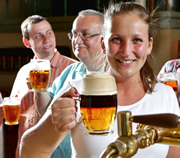 |
|
| |
| Czech people are rightfully proud of their beer. Pilsner Urquell is the original Pils lager from which golden beers the world over are derived. It has been brewed in Plzeň, a Czech town south west of Prague, since 1842, and is commonly perceived as the premier Czech beer. The Pilsner Urquell brewery also makes Gambrinus, which although popular throughout Czechia and sold in pubs in Prague, is hardly known outside the country. Staropramen is brewed in Prague and is sold all over the capital city. The most widely exported Czech beer is Budweiser Budvar (Budvar for short) - this is not to be confused with American Budweiser, which is unrelated. | |
| In addition to the premium beer brands, small breweries across Czechia produce a variety of excellent brews for domestic consumption. Czechs will often choose to drink these local beers over the premium brands not just because they are cheaper, but because they prefer the taste. Bernard, for example, is a highly regarded brewery based in East Bohemia; Cvikov, in the forested north of Czechia, make terrific unpasteurised lagers; in the west of the country, Žatec produces the fine Malostranská Pils; and,
Únětický Pivovar, located just outside Prague, brews delicious filtered and unfiltered beers under the name Únětice. |
|
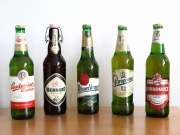
Czech beer in Prague |
| |
| Other Czech beers to look out for are
Kozel, Radegast, Starobrno, Krušovice, Svijanské, Lobkowicz and Breznák. In recent years, Czech breweries have expanded their range, with some now brewing dark ales too, "tmavé pivo". Velkopopovický Kozel Černý and Krušovice Černá beers, for example, are almost black in colour, and are served with a thick dark foam on top. If you prefer an English-inspired ale, Velvet by Staropramen is a smooth and creamy dark beer. There are also
pale ales, IPAs and wheat beers ("Pšeničné pivo"); the non-bitter taste of wheat beer can be very refreshing, particularly in the summer. | |
Price of Beer in Prague
The typical price of a large beer (0.5l) in Prague is 69 CZK (£2.46/€2.88/$3.45) in normal pubs and bars.The typical price of a large beer (0.5l) in Czechia outside Prague is 49 CZK (£1.75/€2.04/$2.45). Beer is so engrained in the national psyche that brewers are always wary of raising prices, and no politician would dare raise taxes too high either! Indeed, some brewers make such little profit on domestic sales that exports are vital to their business model. So when in Prague, and Czechia in general, sample Pilsner Urquell, Staropramen, Budvar and the local Czech beers in the best way possible: fresh, chilled and cheap! | |
Beer in Pubs
In common with bars the world over, most Czech pubs use barrelled beers. Barrels are easy to manage and allow even the smallest pub to serve great tasting beers, provided things are done correctly.The lengths certain pubs in Prague go to in their quest to serve the cleanest, most vibrant beer is extraordinary.
Being a bartender in Czechia is a profession, a job to be proud of. Whereas it might be normal for pubs in other countries to clean their beer pipes once a week, some pubs in Prague will go through the process as often as twice a day! A good bartender will be keen for customers to sample their full range of beers. To this end, you might see a 'flight of beers' on the drinks menu.
This is a wooden holder containing 5 or 6 taster glasses of different beers. Customers can even sign up for a tutored tasting. An example of a small pub that cleans it pipes twice a day plus does a good 'flight of beers' is
Pult on V Celnici. For a tutored beer tasting,
try the Czech Beer Tasting experience. | |
Tank Beer in Pubs & Restaurants
In the past 20 years, developments in brewing technology have led to the introduction of tank beer ("tankové pivo" or "pivo z tanku") in some pubs and restaurants in Prague.Instead of in barrels, beer is transported from the brewery to the pub by tanker lorry.
At the pub, in the same manner a fuel tanker delivers its load, the beer is piped into a great stainless steel pressurised tank. This is lined with an airtight waterproof polypropylene bag, which seals the beer in. | |
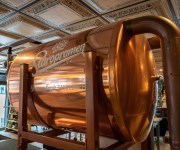 |
| |
|
Crucially, the beer delivered to the tank is unpasteurised (nepasterizované), sometimes unfiltered too. Pasteurisation flash boils beer to ensure its longevity when stored in traditional barrels, however it takes away some of the subtlety of taste and aroma. By storing the beer in airtight tanks, you remove the need for pasteurisation. When a bartender pours the customer a beer, and it flows from the tank to the beer pump to the glass, it is the first contact the beer has had with air. The result is a beer so fresh it's like drinking it directly at the brewery. A tank would traditionally be stored in the cellar at the pub, but increasingly you find them on display in the main bar area as an aesthetic feature. The huge, free-standing, highly polished cylinder advertises that the pub has tank beer on tap. Breweries Pilsner Urquell/Gambrinus and Staropramen lead the field in tank beer, followed by Budvar and Kozel. Not all pubs can employ the tank system. To make it viable requires considerable investment, a high turnover of beer, and storage space for the tank. But its adoption has grown rapidly in Prague, because the difference in taste and the economies of scale for a pub are impressive. | |
| TANK BEER IS SERVED AT THESE PUBS ("PIVNICE"/"HOSPODA") IN PRAGUE: | |
| OLD TOWN PUBS: U Medvidku on Na Perstyne (Budvar), U Vejvodu on Jilska (Pilsner Urquell), Kolkovna on V Kolkovne (Pilsner Urquell), U Pivrnce on Maiselova (Staropramen), Pivnice Štupartská on Štupartská (Gambrinus), Lokál Dlouhááá on Dlouhá (Pilsner Urquell), U Zlatého tygra on Husova (Pilsner Urquell), U Rudolfina on Křižovnická (Pilsner Urquell). NEW TOWN PUBS: U Pinkasů on Jungmannovo náměstí (Pilsner Urquell), Kolkovna Celnice on V Kolkovne (Pilsner Urquell), Hospoda Lucerna on Vodičkova (Pilsner Urquell), Lokál U Jiráta on Vodičkova (Pilsner Urquell), Pivovar Národní on Národní (Pilsner Urquell), Dutch Pub (Krušovice). LESSER TOWN PUBS: Lokál U Bílé kuželky on Míšeňská (Pilsner Urquell). CASTLE DISTRICT PUBS: U Černého vola on Loretánské náměstí (Pilsner Urquell) NEAR CITY CENTRE PUBS: Dva kohouti on Sokolovská, Prague 8 | |
| TANK BEER IS SERVED AT THESE RESTAURANTS ("RESTAURACE") IN PRAGUE: | |
| OLD TOWN RESTAURANTS: Ribs of Prague on Melantrichova (Pilsner Urquell), Potrefena Husa on Platnerska (Staropramen), U Vejvodu on Jilska (Pilsner Urquell), Restaurace Mincovna at Old Town Square (Pilsner Urquell), V Cípu on Michalská (Staropramen), Krčma on Kostečná (Pilsner Urquell), Na čepu on Ovocný trh (Pilsner Urquell) and Kozlovna Apropos on Křižovnická (Kozel). NEW TOWN RESTAURANTS: Vytopna Restaurant on Wenceslas Square (Krušovice), Sladovna Restaurant on Vodičkova (Cvikov), Kozlovna U Paukerta on Národní (Kozel),
RiBro Ribhouse on Spálená (Gambrinus), Kantyna on Politických vězňů (Pilsner Urquell + Kozel Černý), Bredovsky Dvur on Politických vězňů (Pilsner Urquell), U Jindřišské věže on Jindřišská (Gambrinus), U staré pošty on Opletalova (Pilsner Urquell). LESSER TOWN RESTAURANTS: Pork's on Mostecká (Pilsner Urquell) and U Glaubiců on Malostranské náměstí (Pilsner Urquell). | |
Microbrewery Pubs
Microbreweries were the foundation of the Czech brewing industry (see 'Foundation' below). Fast forward a thousand years and an increasing number of pubs in Prague are reviving the tradition, brewing their own beer on site.In the modern age of the global brewer, it can be nice to taste a unique craft beer, and see it being made: visit a microbrewery pub, order a beer, then take a look around the premises; the whole brewing process may not be visible, but you should get a good idea how it is done. | |
| BEER IS BREWED AT THESE PUBS ("PIVNICE" OR "HOSPODA") IN PRAGUE: | |
| |
| For a guided visit to the best Prague pub microbreweries, try the Prague Brewery Tour. | |
Foundation of the Czech Beer Industry
Czechs have been drinking beer for more than a millennium. The secret behind their brewing success is the country's agricultural conditions, which are ideal for growing hops. | |
| Chronicles place the cultivation of Bohemian hops as early as AD 859, while the first evidence for the export of hops dates to AD 903. Bohemian hops became so prized that King Wenceslas (907-935) ordered the death penalty for anyone caught exporting the cuttings. In another act, he convinced the Pope
to revoke an order banning beer brewing - which
may explain why he is known as Good King Wenceslas! |
|
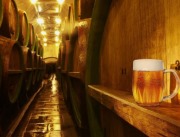 |
| |
| In the early days of brewing, citizens of the Czech lands were only allowed to brew beer for their own consumption. Many people, therefore, set up a microbrewery in their home. It wasn't long before citizens banded
together to form a co-operative central brewery, from
which they would take beer extract home and finish the
brewing process there; the medieval equivalent of the home-brew kit. The first such brewery was built in Cerhenice in 1118. From here, once the king's permission had been granted, it
was a small step for breweries to begin
hawking their wares to the general public. The Czech beer industry was spawned. | |
DecLine And Rise of Czech Beer Brewing: 16th-19th Centuries
The expansion of the beer industry was halted in the 16th century, when feudal lords discovered that forcing their
labourers to drink the manor brew, instead of buying their beer from another brewery, was a clever way to
line their pockets. |
|
| The Thirty Years' War then devastated the country, and Czech beer brewing in particular, as land was destroyed and resources were diverted elsewhere. At one point, beer was even used to pay off the Swedish
army to prevent the plunder of Kutna Hora. The Czech beer industry fell under the auspices of
the Emperor in Vienna, and the situation remained dismal for many years, until the "Czech National Revival" movement in the late 18th and 19th centuries spurred the reinvention of the Czech language,
Czech institutions and Czech culture. Czech beer was about to experience a renaissance. |
|
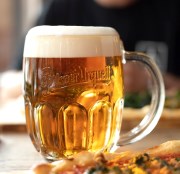 |
| |
Pilsner Urquell: Beer Reinvented in 1842
Beer had been brewed in the city of Plzeň in Western Bohemia since the 1200s, but like elsewhere in the world it was dark, top-fermented beer. In 1842 this changed, when Pilsner Urquell produced the world's first golden lager. It was achieved through a new method of bottom fermentation, and by storing the beer in cold cellars cut into rock.The new tasting pale lager, with its unrivalled clarity, was in such demand that it led to the establishment of new pubs in Prague, such as U Pinkasů at Jungmannovo náměstí, which to this day still sells Pilsner Urquell. The new brewing technique was rapidly copied by brewers across the world. A Czech
brewmaster was even sent to Mexico to teach Mexicans
how to brew beer (Bohemia beer from Mexico
gets its name from this period). | |
20th Century: Beer Under Communism
In the 20th century, under communism, the state took control of the brewing industry, and beer became very cheap. Indeed it was mandated to be so. The idea was that every man, no matter what job he did, should be able to afford a few beers regularly with friends without it hurting his pocket too much.This helped to establish beer drinking as perhaps the single most popular hobby among Czech men. Unfortunately, as with other industries, the Communists failed to invest in the breweries. They simply produced beer and squeezed as much out of the industry as they could, leaving the buildings and equipment deteriorate. | |
After the Velvet Revolution: 1989
Since the fall of communism in 1989, there has been a rejuvenation of Czech brewing, but it has come at a price. All the major Czech breweries, apart from Budweiser Budvar, have been bought up by foreign brewing giants.On the upside, a lot of investment has been ploughed in to create impressive modern brewing facilities. And Czech beers are now marketed worldwide as a premium product. Today, nine out of ten beers produced and consumed globally are pale lagers based on the 1842 Pilsner Urquell method. | |
 |
| | | |
Additional Information
To learn more about Czech beer, and to join the Prague locals who drink it by the lorry load, book the Prague Brewery Tour, Czech Beer Tasting, Prague Tour With Local Czech Food & Drinks or Castle Side Tour With Local Czech Food & Drinks. |
| |
| |
|
| Prague Brewery Tour |  | | A fun tour of the best Prague pubs with breweries:
Brewery Tour |
|
|
| |
| |
| |
|